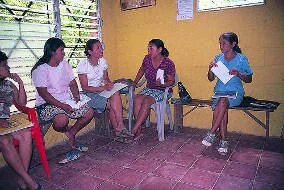
Since the end of the civil war in 1992, El Salvador’s elections have been battles for influence between the right (ARENA) and the left (FMLN). The former liberation front FMLN did not manage to gain power in the national elections until March 2009, but from 1997 to 2009 it ruled the capital city, San Salvador. Dr. Hector Silva, the mayor from 1997 to 2003, had signed up to a “women’s platform” even before he was elected. Under his government, in 1999 the city council resolved a roadmap for achieving sexual equality. Although a series of measures was adopted and women were appointed to leading political roles, progress was painfully slow. However, after the Heinrich Böll Foundation supported a study on personnel policy and made concrete suggestions based upon it, the move to reshape the city administration along gender-democratic lines began to gather momentum.
Originally the plan was limited to greatly increasing the proportion of women working in the administration. Soon, though, gender-based criteria were adopted in the city’s advertisements and job descriptions, and the employees’ own attitudes and aspirations were discussed in an open-minded setting. A procedure for dealing with sexual harassment at work was introduced. Finally, the city government accepted the argument that a gendersensitive
approach to politics benefits not only women, but the administration as a whole. In four years, the ratio of women in senior positions rose from 12% to 48%, while the proportion of women in the “classical” male domains (such as the city security corps, construction, and utilities) rose from 25% to 35%. Reference to gender-specific issues is now made in 90% of the city government’s operational planning documents. The budgets, too, changed in line with the new gender awareness – and as Rosalía Jovel, the Heinrich Böll Foundation’s coordinator for the process, points out, “a plan without a corresponding budget is nothing more than a testament to good intentions.”
The concept of gender democracy was by no means uncontroversial within El Salvador’s women’s movement. However, “our task is to put forward concepts and models that cannot be ignored by political debate,” says Silke Helfrich, who at the time headed the Foundation’s office for Central America, Mexico and the Carribean. In the end the policy was such a resounding success that other groups began to register an interest. For Julia Evelyn Martínez, gender commissioner at the United Nations Development Programme (UNDP), the project was simply “what the UN jargon calls ‘best practice.’” She offered her support for an extension of the project methodology on a national and international scale.
The conservative ARENA party won the city government elections in San Salvador by a narrow majority in early 2009, and only time will tell whether the new gender-sensitive orientation will be sustained under the new political leadership. There is unease in the city administration; some of the city employees in what is still a very ideologically polarized setting are unwilling to work for the ARENA mayor, while at the same time a new movement has arisen among the city’s women, “Women – creators of life and peace,” which aims to work from outside the administration to ensure that the progress achieved is not eroded or reversed by a lack of political commitment. Norman Quijano, the newly appointed mayor, has at least announced he does not want to abandon instruments that have proved useful in the past. And that “usefulness” is exactly what the gender-democratic reforms were aiming to achieve from the start.
Outside the capital, the city government’s example has set a precedent. Other organizations, such as the consumer protection office in El Salvador and some Cuban NGOs, are now applying the participatory approach to organizational development based on gender democracy. Since 2007 the Heinrich Böll Foundation – together with the United Nations Population Fund (UNFPA) and the United Nations Development Fund for Women (UNIFEM) – has been supporting change within the Supreme Court in El Salvador. The Court already had a gender unit and a six-judge gender commission, but setting up posts and panels like these is, at best, only an initial step. The Foundation’s support facilitates systematic work toward the implementation of gender democracy. In fifty-one regionally based and fifteen theme-based workshops, staff from all levels of the Supreme Court’s hierarchy have worked together to draft an “institutional policy for gender equality,” and drawn up an action plan for the next five years (2009–2013).
---
Read more about:
- Brazil: Our bodies, ourselves
- Brazil: Doubly disadvantaged: Black women
- Mexico: “Soft” feminism via the mass media
- Mexico: Feminicide
- Mexico: Human rights without machismo
This Article is published in Gender Politics Makes a Difference - Experiences of the Heinrich Böll Foundation across the world.
- back to overview Women´s Voices Women´s Choices